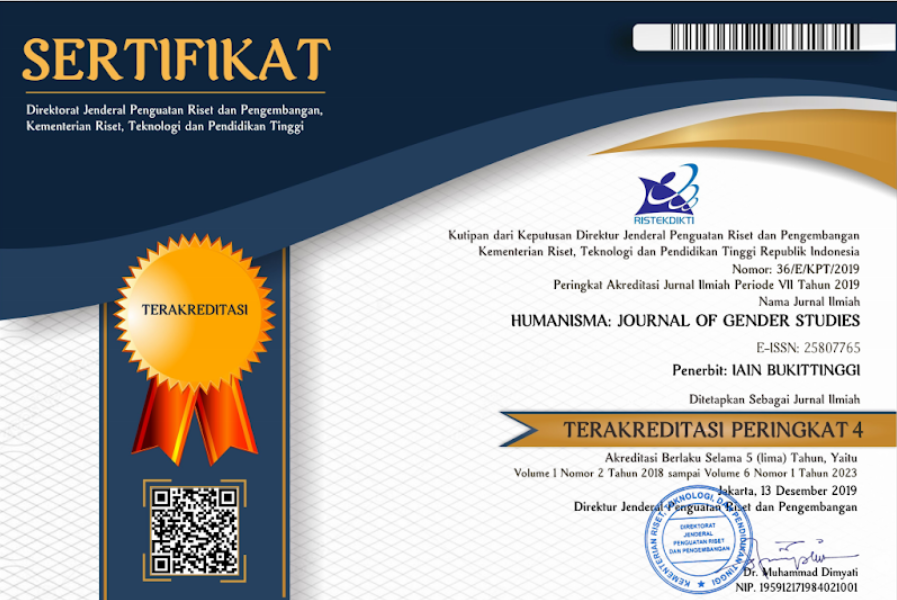Philosophical Examination of the Itsbat Nikah (Marriage Legalization) in Sirri Polygamy Following the Issuance of Supreme Court Circular No. 3 of 2018
DOI:
https://doi.org/10.30983/humanisma.v8i1.8266Keywords:
Marriage legalization, Sirri Polygamy, Maqashid SyariahAbstract
Supreme Court Circular (SEMA) No. 3 of 2018 has effectively eliminated the possibility of granting requests for marriage registration in cases of polygamous marriages based on unregistered unions. This provision raises concerns about its potential to create various problems, particularly in relation to the protection of women and children. This research aims to analyze the issues arising in marriage law following the issuance of SEMA No. 3 of 2018 and its relevance to the protection of women and children, as well as the regulation of itsbat nikah (marriage legalization) for sirri polygamous marriages from the perspective of maqashid sharia. The study employs a library research methodology, utilizing secondary data sources. The data were collected through literature reviews and analyzed using qualitative data analysis methods. The findings indicate that the regulation of itsbat nikah for sirri polygamous marriages under SEMA No. 3 of 2018 aligns with the principles of protecting women and children. This regulation was introduced to uphold the core values enshrined in Indonesia’s marriage laws. From the perspective of maqashid sharia, the provisions in SEMA No. 3 of 2018 correspond to the objectives of maqashid in preserving maslahah (public interest) at the dharuriyat level, particularly in safeguarding religion, lineage, and property.
References
Book
Abdul Manan, Aneka Masalah Hukum Perdata Islam Di Indonesia (Kencana, 2006)
Al-Zuhaily, Wahbah, Ushul Al-Fiqh Al-Islami (Dar al-Fikr, 1986)
Aminuddin, Slamet Abidin dan H., Fiqh Munakahat (CV. Pustaka Setia, 1999)
Busyro, Maqashid Syariah, Pengetahuan Mendasar Memahami Mashlahah, Jakarta (Kencana Prenada Media Group, 2019)
Hawwas, Abdul Aziz Muhammad Azam dan Abdul Wahab Sayyed, Fiqih Munakahat (Amzah, 2009)
Helim, Abdul, Maqashid Al-Syariah Versus Ushul Al-Fiqh (Pustaka Pelajar, 2019)
Mestika Zed, Metode Penelitian Kepustakaan (Yayasan Obor Indonesia, 2008)
Muhammad Al-Raisuni, Nadariyat Al-Maqashid ‘Inda Al-Imam Al-Syatibi (Mu’assasah Al-Jami’ah, 1992)
Muhammad Said bin Ahmad bin Mas’ud al-Yubi, Maqashid Al-Syariah Al-Islamiyah Wa ‘Alaqatuha Bi Al-Adillah Al-Syar’Iyyah (Dar al-Hijrah, 1998)
Sugiyono, Metode Penelitian Kuantitatif Kualitatif Dan R&D (Alfabeta, 2018)
Journal
Ardhian, Reza Fitra, Satrio Anugrah, and Bima Setyawan, ‘Poligami Dalam Hukum Islam Dan Hukum Positif Indonesia Serta Urgensi Pemberian Izin Poligam Di Pengadilan Agama’, Privat Law, 3.2 (2015), p. 48
Bafadhal, Faizah, ‘Itsbat Nikah Dan Implikasinya Terhadap Status Perkawinan Menurut Peraturan Perundang-Undangan Indonesia’, Jurnal Ilmu Hukum, 1.1 (2014), p. 3
Bahrum, Mukhtaruddin, ‘Problematika Isbat Nikah Poligami Sirri’, Al-Adalah: Jurnal Hukum Dan Politik Islam, 4.2 (2019), pp. 194–213, doi:10.35673/ajmpi.v4i2.434
Haliah, Dahlia, ‘Nikah Sirri Dan Perlindungan Hak-Hak Wanita Dan Anak ( Analisis Dan Solusi Dalam Bingkai Syari ’ Ah )’, 1 (2016)
Karamoy, Engelien R. Palandeng dan Roy V., ‘Tinjauan Yuridis Terhadap Perkawinan Sah Secara Agama Tetapi Tidak Sah Secara Hukum Positif Indonesia’, Lex Privatum, VIII.2 (2020), p. 32
Musyafah, Aisyah Ayu, ‘Perkawinan Dalam Perspektif Filosofis Hukum Islam’, Jurnal Crepido, 02.02 (2020), p. 111
Rahim, Virahmawaty Mahera dan Arhjayati, ‘Pentingnya Pencatatan Perkawinan’, As-Syams: Jurnal Hukum Islam, 3.2 (2022), p. 98
Sayyad, Muhammad Amin, ‘Urgensi Pencatatan Nikah Sebagai Rukun Nikah (Studi Kritis Pemikiran Siti Musda Mulia Dan Khoiruddin Nasution)’, El-Mashlahah Journal, 8.1 (2018), p. 4
Tang, Ahmad, ‘Hak-Hak Anak Dalam Pasal 54 UU No. 35 Tahun 2014 Tentang Perlindungan Anak’, Jurnal Al-Qayyimah, 2.2 (2020), pp. 98–111, doi:10.30863/aqym.v2i2.654
Downloads
Published
How to Cite
Issue
Section
Citation Check
License
Copyright (c) 2025 Adriyeni, Zikra Wahyuni, Dahyul Daipon

This work is licensed under a Creative Commons Attribution-ShareAlike 4.0 International License.
Authors who publish with this journal agree to the following terms:
- Authors retain copyright and grant the journal right of first publication with the work simultaneously licensed under a Creative Commons Attribution-ShareAlike 4.0. that allows others to share the work with an acknowledgment of the work's authorship and initial publication in this journal.
- Authors are able to enter into separate, additional contractual arrangements for the non-exclusive distribution of the journal's published version of the work (e.g., post it to an institutional repository or publish it in a book), with an acknowledgment of its initial publication in this journal.
- Authors are permitted and encouraged to post their work online (e.g., in institutional repositories or on their website) prior to and during the submission process, as it can lead to productive exchanges, as well as earlier and greater citation of published work (See The Effect of Open Access).



